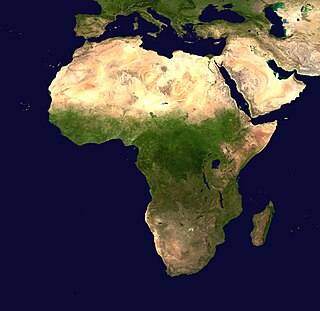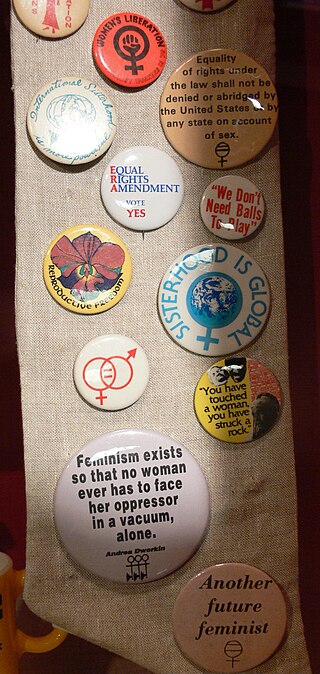A feminist is a person who supports or engages in feminism.
Feminist(s) may also refer to:
- The Feminists, an American feminist group that was active from 1968 to 1973
- Feminist, a story arc in the comic strip Pugad Baboy
A feminist is a person who supports or engages in feminism.
Feminist(s) may also refer to:
Feminism is a range of socio-political movements and ideologies that aim to define and establish the political, economic, personal, and social equality of the sexes. Feminism holds the position that societies prioritize the male point of view and that women are treated unjustly in these societies. Efforts to change this include fighting against gender stereotypes and improving educational, professional, and interpersonal opportunities and outcomes for women.
Individualist feminism, also known as ifeminism, is a libertarian feminist movement that emphasizes individualism, personal autonomy, freedom from state-sanctioned discrimination against women, and gender equality.
Liberal feminism, also called mainstream feminism, is a main branch of feminism defined by its focus on achieving gender equality through political and legal reform within the framework of liberal democracy and informed by a human rights perspective. It is often considered culturally progressive and economically center-right to center-left. As the oldest of the "Big Three" schools of feminist thought, liberal feminism has its roots in 19th century first-wave feminism seeking recognition of women as equal citizens, focusing particularly on women's suffrage and access to education, the effort associated with 19th century liberalism and progressivism. Liberal feminism "works within the structure of mainstream society to integrate women into that structure." Liberal feminism places great emphasis on the public world, especially laws, political institutions, education and working life, and considers the denial of equal legal and political rights as the main obstacle to equality. As such liberal feminists have worked to bring women into the political mainstream. Liberal feminism is inclusive and socially progressive, while broadly supporting existing institutions of power in liberal democratic societies, and is associated with centrism and reformism. Liberal feminism tends to be adopted by white middle-class women who do not disagree with the current social structure; Zhang and Rios found that liberal feminism with its focus on equality is viewed as the dominant and "default" form of feminism. Liberal feminism actively supports men's involvement in feminism and both women and men have always been active participants in the movement; progressive men had an important role alongside women in the struggle for equal political rights since the movement was launched in the 19th century.
Second-wave feminism was a period of feminist activity that began in the early 1960s and lasted roughly two decades, ending with the feminist sex wars in the early 1980s and being replaced by third-wave feminism in the early 1990s. It occurred throughout the Western world and aimed to increase women's equality by building on the feminist gains of the late 19th and early 20th centuries.

Third-wave feminism is a feminist movement that began in the early 1990s, prominent in the decades prior to the fourth wave. Grounded in the civil-rights advances of the second wave, Gen X third-wave feminists born in the 1960s and 1970s embraced diversity and individualism in women, and sought to redefine what it meant to be a feminist. The third wave saw the emergence of new feminist currents and theories, such as intersectionality, sex positivity, vegetarian ecofeminism, transfeminism, and postmodern feminism. According to feminist scholar Elizabeth Evans, the "confusion surrounding what constitutes third-wave feminism is in some respects its defining feature."
Girl power is a slogan that encourages and celebrates women's empowerment, independence, confidence and strength. The slogan's invention is credited to the US punk band Bikini Kill, who published a zine called Bikini Kill #2: Girl Power in 1991. It was then popularized in the mainstream by the British girl group Spice Girls in the mid-1990s. According to Rolling Stone magazine, the Spice Girls' usage of "girl power" was one of the defining cultural touchstones that shaped the Millennial generation, particularly during their childhood in the 1990s. However, since the maturing of older Millenials in the late 2000s, it has increasingly been dropped in favor of challenging real-world sexism that has become mainstream as of Generation Z's maturing of the 2020s.

Feminist sociology is an interdisciplinary exploration of gender and power throughout society. Here, it uses conflict theory and theoretical perspectives to observe gender in its relation to power, both at the level of face-to-face interaction and reflexivity within social structures at large. Focuses include sexual orientation, race, economic status, and nationality.

Intersectionality is a sociological analytical framework for understanding how groups' and individuals' social and political identities result in unique combinations of discrimination and privilege. Examples of these factors include gender, caste, sex, race, ethnicity, class, sexuality, religion, disability, height, age, weight and physical appearance. These intersecting and overlapping social identities may be both empowering and oppressing. However, little good-quality quantitative research has been done to support or undermine the practical uses of intersectionality.
Antifeminism, also spelled anti-feminism, is opposition to feminism. In the late 19th century and early 20th century, antifeminists opposed particular policy proposals for women's rights, such as the right to vote, educational opportunities, property rights, and access to birth control. In the mid and late 20th century, antifeminists often opposed the abortion-rights movement.
Lipstick feminism is a variety of feminism that seeks to embrace traditional concepts of femininity, including the sexual power of women, alongside traditional feminist ideas. The concept emerged within the third-wave as a response to ideals created by previous movements, where women felt that they could not both be feminine and a feminist.
Since the 19th century, men have taken part in significant cultural and political responses to feminism within each "wave" of the movement. This includes seeking to establish equal opportunities for women in a range of social relations, generally done through a "strategic leveraging" of male privilege. Feminist men have also argued alongside writers like bell hooks, however, that men's liberation from the socio-cultural constraints of sexism and gender roles is a necessary part of feminist activism and scholarship.

African feminism includes theories and movements which specifically address the experiences and needs of continental African women. From a western perspective, these theories and movements fall under the umbrella label of Feminism, but this categorization is misleading for many branches of African "feminism". African women have been engaged in gender struggle since long before the existence of the western-inspired label "African feminism," and this history is often neglected. Despite this caveat, this page will use the term feminism with regard to African theories and movements in order to fit into a relevant network of Wikipedia pages on global feminism. Because Africa is not a monolith, no single feminist theory or movement reflects the entire range of experiences African women have. African feminist theories are sometimes aligned, in dialogue, or in conflict with Black Feminism or African womanism. This page covers general principles of African feminism, several distinct theories, and a few examples of feminist movements and theories in various African countries.
Transnational, or transnationality, may refer to:

A variety of movements of feminist ideology have developed over the years. They vary in goals, strategies, and affiliations. They often overlap, and some feminists identify themselves with several branches of feminist thought.
Feminism is one theory of the political, economic, and social equality of the sexes, even though many feminist movements and ideologies differ on exactly which claims and strategies are vital and justifiable to achieve equality.
Networked feminism is a phenomenon that can be described as the online mobilization and coordination of feminists in response to sexist, misogynistic, racist, and other discriminatory acts against minority groups. This phenomenon covers all possible definitions of what feminist movements may entail, as there have been multiple waves of feminist movements and there is no central authority to control what the term "feminism" claims to be. While one may hold a different opinion from another on the definition of "feminism", all those who believe in these movements and ideologies share the same goal of dismantling the current patriarchal social structure, where men hold primary power and higher social privileges above all others. Networked feminism is not spearheaded by one singular women's group. Rather, it is the manifestation of feminists' ability to leverage the internet to make traditionally unrepresented voices and viewpoints heard. Networked feminism occurs when social network sites such as Facebook, Twitter and Tumblr are used as a catalyst in the promotion of feminist equality and in response to sexism. Users of these social media websites promote the advancement of feminism using tools such as viral Facebook groups and hashtags. These tools are used to push gender equality and call attention to those promoting anything otherwise. Online feminist work is a new engine of contemporary feminism. With the possibility of connecting and communicating all around the world through the Internet, no other form of activism in history has brought together and empowered so many people to take action on a singular issue.
Hip hop feminism is a sub-set of black feminism that centers on intersectional subject positions involving race and gender in a way that acknowledges the contradictions in being a black feminist, such as black women's enjoyment in hip hop music and culture, rather than simply focusing on the victimization of black women in hip hop culture due to interlocking systems of oppressions involving race, class, and gender.
Feminism and technology may refer to:
Feminist activism in hip hop is a feminist movement based by hip hop artists. The activism movement involves doing work in graffiti, break dancing, and hip hop music. Hip hop has a history of being a genre that sexually objectifies and disrespects women ranging from the usage of video vixens to explicit rap lyrics. Within the subcultures of graffiti and breakdancing, sexism is more evident through the lack of representation of women participants. In a genre notorious for its sexualization of women, feminist groups and individual artists who identify as feminists have sought to change the perception and commodification of women in hip hop. This is also rooted in cultural implications of misogyny in rap music.
Fourth-wave feminism is a feminist movement that began around the early 2010s and is characterized by a focus on the empowerment of women, the use of Internet tools, and intersectionality. The fourth wave seeks greater gender equality by focusing on gendered norms and the marginalization of women in society.